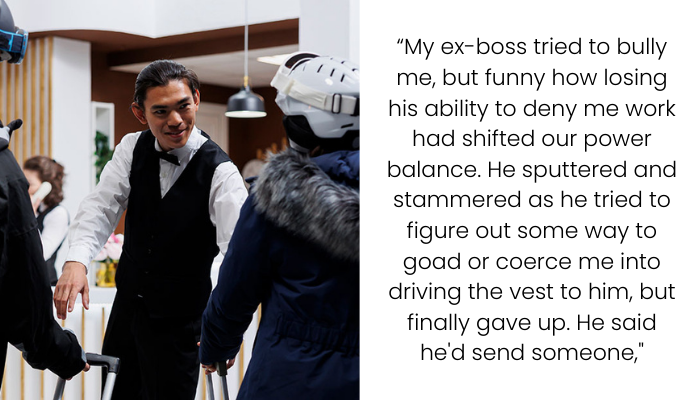Man Leaves Wife for Mistress—But His Daughters Weren’t About to Let It Slide
In a story that straddles the line between revenge and recklessness, a 42-year-old mother faces backlash after her teenage daughters secretly laced their father’s new wife’s food with laxatives during the rehearsal dinner. The prank left the bride-to-be suffering from stomach issues during one of the most important weekends of her life—her wedding. While the bride remained unaware of the real cause, the mother’s decision not to discipline her daughters has sparked a wave of controversy.
The mother, still nursing heartbreak from her husband’s infidelity with the woman he ultimately married, admitted to laughing at the prank but emphasized that she did tell the girls it was inappropriate. Despite pressure from her ex-husband to ground the teens, she refused, citing their emotional pain and the upcoming birthdays as justification for going easy. With phones involved, co-parenting clashing, and unresolved pain, the situation quickly escalated beyond a teenage stunt. But was her reaction justified—or dangerously enabling?
Some people take revenge way too far and end up lashing out in ways that are not just unhealthy but straight-up toxic

A woman shocked the net by sharing how she rewarded her twins who ruined her ex-husband’s new wedding






















When Emotional Fallout Meets Legal Risk and Ethical Grey Zones
This case isn’t just about a prank—it’s about grief, betrayal, teen psychology, parental responsibility, and the very real legal and ethical boundaries that can be crossed, even unintentionally.
Emotional Trauma and Adolescent Behavior
Teenagers often act out when navigating emotional upheaval, especially following the trauma of parental infidelity. Children who witness a parent being hurt by the other often internalize those emotions, channeling them through rebellion or aggression. According to the American Academy of Child and Adolescent Psychiatry (AACAP), adolescents experiencing parental separation or divorce often show increased behavioral issues, including bullying and defiance (AACAP).

In this case, the mother’s daughters have displayed bullying behavior at school and disrespect at home. While the prank might have seemed harmless or even justified in their eyes, it signals a deeper unresolved anger. Rather than grounding, what they might need more urgently is professional counseling, especially since they are already on a waitlist.
The Legal Consequences of “Just a Prank”
From a legal standpoint, this situation veers dangerously close to criminal behavior, especially because lacing someone’s food without consent, regardless of the substance, can be considered battery or even poisoning, depending on jurisdiction.
In many states, including California and New York, deliberately tampering with someone’s food can be prosecuted under assault statutes or as administering a harmful substance, even if the intent was comedic or petty revenge. As per Justia, even substances that are not inherently lethal—like laxatives—can lead to charges if they cause distress or injury (Justia Food Tampering Laws).
Given that the daughters are 16, they are still minors, but not too young to be held juvenilely accountable if the event were reported or discovered. While the father’s decision to keep the incident quiet may shield them for now, the risks remain real—and the consequences could be serious if the bride were ever to find out.
Parental Responsibility and Co-Parenting Disputes
From a co-parenting perspective, this incident illustrates how unresolved resentment between divorced partners can negatively impact their children. The father is understandably furious, wanting to discipline the daughters for what could be classified as malicious behavior, but the mother refuses, partially out of bitterness and partially from empathy.
Co-parenting experts recommend that discipline be consistent across households. According to Psychology Today, when parents fail to support each other in disciplinary decisions, children often feel confused and emboldened to test boundaries (Psychology Today on Co-Parenting).
Refusing to back the father’s stance on grounding—especially in such a serious situation—sends a dangerous message to the teens: that retaliation is permissible if it’s emotionally satisfying.
The Morality of Revenge and Accountability
It’s easy to empathize with the mother, especially given how deeply personal and painful betrayal can be. But ethical parenting requires rising above personal vendettas. By not punishing the daughters—and worse, laughing at the incident—the mother risks condoning vindictive behavior as a valid emotional outlet.

This is especially problematic when framed in the context of developing empathy and emotional intelligence in teenagers. Allowing them to believe that harming someone is justified if that person hurt your family undermines the very principles of accountability, maturity, and conflict resolution that are foundational to adulthood.
Moreover, the prank targeted the mistress-turned-wife during what was meant to be her happiest day—a moment many dream of for years. Even if she played a role in the breakdown of the family, revenge tactics do not foster healing, and certainly don’t help young people grow into emotionally healthy adults.
Some of the people who read the online story thought that everyone involved was a jerk






Gray Areas and Lessons Unlearned
This story is less about assigning blame and more about recognizing missed opportunities for healing and growth. A hurt mother excused a harmful act committed by her emotionally volatile daughters against a woman she despises. A father, equally flawed, demanded discipline without acknowledging the emotional wounds his actions inflicted on his kids.
In the aftermath, nobody really wins. Not the bride, who unknowingly suffered a humiliating ordeal; not the father, who’s lost control over his daughters’ behavior; and certainly not the mother, who—despite finding brief satisfaction in the prank—may later regret not using the moment as a teaching opportunity.
Ultimately, emotional pain doesn’t justify unethical behavior. And while laughter may be a coping mechanism, silence or indulgence in the face of wrongdoing only delays the accountability children must eventually learn.
Letting go of vengeance—even in small, silly forms—is hard. But sometimes, real strength lies in helping our kids process hurt without passing it along.







